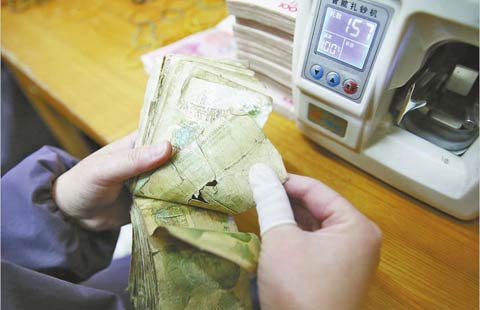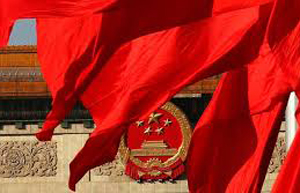PBOC restarts bill repurchase, RRR cut likely
(Xinhua) Updated: 2012-05-07 14:56
|
|||
China's central bank has restarted bill repurchase to inject cash to banks, reversing normal practice for this to happen ahead of holidays, a shift which has underscored tight liquidity and led to anticipation of further cuts in the reserve requirement ratio (RRR).
The People's Bank of China repurchased bills worth 65 billion yuan ($10.32 billion) through open market operation Thursday. It was the first time since 2003 that such a move has been made outside of the Spring Festival holiday and supports the central bank's previous pledge that it will scale up bill repurchase to ease liquidity.
With 52 billion yuan of purchased bills due this week, the central bank has injected 117 billion yuan, the largest weekly volume in the past 15 weeks.
Restarting bill repurchase makes sense given the current liquidity strains, bank dealers said.
China's yuan funds outstanding for foreign exchange increased 124.7 billion yuan in March, but the 289 billion yuan totalled in the first quarter of 2012 was not significant.
This means the central bank injected 289 billion yuan worth of foreign exchange to commercial banks in the first quarter to offset the same amount of foreign exchange inflow, comprised of trade surplus and overseas speculative money, as renminbi is inconvertible under the capital account.
Meanwhile, as individual bank savers lean to shift their money away from banks to other investments with higher returns, banks lack money sources.
To ease liquidity, the central bank lowered the RRR, the money that commercial banks should set aside in reserves, by 50 basis point and repurchased bills twice at the beginning of 2012. Those moves injected at least 300 billion yuan to the market. In addition, the central bank suspended the issuance of central bank bills.
Forecasting the monetary policy trend, E Yongjian, a researcher with the Bank of Communications, said open market operation is expected to be a major means under which the central bank will keep reasonable liquidity level.
Peng Wensheng, chief economist of the China International Capital Co, said with growing market demand and the yuan funds outstanding for foreign exchange slowing, monetary policy is poised to become looser, which makes the RRR cut essential. Gao Yongbiao, an analyst with Sealand Securities, predicated the RRR cut would come as early as the middle or end of this month, if April's Consumer Price Index, a main gauge of inflation, stayed high.
For more subscription details of China Banking , please visit our E-Shop .
- Foreign equipment firms to step up localization drive
- Building a lasting foundation amid tough domestic market
- S&P 500 posts worst day since Oct, energy shares sink
- Economists recommend 7% growth goal in 2015
- China's Africa aid "not neocolonialism"
- US reaches out to China on clean energy cooperation
- Dalian Wanda boosts HK appetite for floats
- CSI Index continues upward march

















